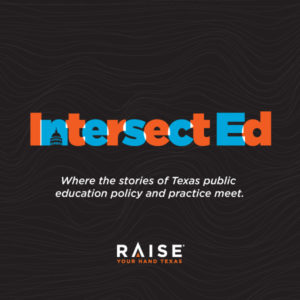
categories
Across the Lawn May 14, 2021

May 14, 2021
 87th Legislative Session Weekly Update | Friday, May 14, 2021
87th Legislative Session Weekly Update | Friday, May 14, 2021
The FIVE Things to Know and ONE Thing to Do
Welcome to Across the Lawn, Issue 19.
The eighteenth week of the 87th Legislative Session has come to a close. Check out our one thing to do and five things to know.
Raise Your Hand Texas has a front-row seat to the 87th Legislature (we can see the Capitol across the south lawn). From our vantage point, public education policy issues have never been more important. This weekly session update will keep you informed and engaged.
The One Thing to Do:
Contact your Senator and tell them you oppose test-based funding. SB 2094 is on the Senate Intent calendar, which means it can be debated as early as tomorrow (likely Monday).
The bill creates an Accelerated Learning and Sustainment Outcomes Bonus, or test-based (outcomes-based) funding. Eligible accelerated learning students could earn a bonus for schools if certain scores are met on STAAR — up to $500 for non-economically disadvantaged students and $1,000 for economically disadvantaged students.
Raise Your Hand Texas believes basing any part of our school finance system on student test performance, or outcomes-based funding, would create further inequities and unintended consequences.
Five Things to Know:
1. Questions Still Remain on Federal Stimulus Funding for Public Education
With less than three weeks left in the 2021 legislative session, lawmakers are still debating whether to implement additional state guidelines for federal stimulus funding for our schools.
The Senate Education Committee has added new language to the Senate Committee Substitute for HB 1525 (the school finance system “clean-up” bill) that would restrict how quickly schools could spend the $11.2 billion they will receive from the third round of federal stimulus funds.
Under federal guidelines, these funds may be used for COVID-19 related issues dating back to March 13, 2020, through September 30, 2024. However, under HB 1525’s proposed provisions, schools would be required to “bank” up to 40 percent of these funds so they could be spent over five years instead of three.
State leaders have committed to flowing round three stimulus funding to districts but have yet to resolve questions about how the $5.5 billion from round two will be distributed.
Read more about the questions that remain around federal stimulus funding for education.
2. Test-Based Funding Stripped from House Bill
HB 4545 by Rep. Harold Dutton passed from the House Thursday after a motion to reconsider. The bill originally contained an outcomes-based funding provision providing up to $1,000 for certain students who performed at a certain level on the STAAR test, but members removed the language Tuesday during the floor debate. Rep. Dutton made a motion to reconsider the bill because it did not receive enough votes to pass Tuesday.
One of the provisions remaining in the bill enables the Texas Education Agency to use some of its portion of federal stimulus funding to provide accelerated instruction to students who do not perform satisfactorily on the STAAR. Other key provisions include:
- Removing the current prohibition against a student being promoted if the student does not perform satisfactorily on the 5th or 8th grade math or reading STAAR
- Requiring an accelerated learning committee to develop an educational plan for students who do not perform satisfactorily on the STAAR
- Allowing parents of students who fail to perform satisfactorily on STAAR in certain grades to choose the classroom teacher who will provide instruction
SB 2094 by Sen. Larry Taylor contains similar language, as well as the outcomes-based funding provision. It has passed out of the Senate Education Committee but has yet to be debated on the Senate floor.
3. TEA Releases Federal Stimulus Stakeholder Survey
The Texas Education Agency on Thursday released its stakeholder survey for round three federal stimulus funds. The Stakeholder Engagement Survey will close by 5 p.m. May 21.
Those who take the survey should be aware that a question regarding remedial services for students with disabilities contemplates direct payments to parents, rather than support for public school programs.
Raise Your Hand opposed this concept during the legislative session (SB 1716) because services for students with disabilities should involve all of the stakeholders through the student’s Individual Education Plan (IEP).
Please encourage the Commissioner to ensure federal stimulus dollars are not spent on unproven programs like vouchers or outcomes-based funding.
4. What to Watch the Last 17 Days of the Legislative Session
- The state budget, SB 1 by Sen. Jane Nelson, is still in conference committee. The Foundation School Program is fully funded, including all of the programs passed in last session’s HB 3. It is worth watching to see if the conferees earmark any of the $5.5 billion still unallocated from the second round of federal stimulus to schools.
- HB 41 by Rep. James Talarico passed the House today. This bill requires a class size limit for public school pre-kindergarten of 22 to 1.
- HB 1468 by Rep. Keith Bell, the remote learning bill, has been referred to the Senate Education Committee. It will be worth watching to see if this bill starts moving. SB 27, the Senate’s virtual school bill by Sen. Taylor, has not been debated on the Senate floor.
- HB 3979 by Rep. Steve Toth was voted from the House this week. This bill was debated heavily because of its potential to limit instruction and student learning related to current events, public policy, and issues of race. SB 2202 by Sen. Brandon Creighton, containing similar language, was already voted from the Senate.
- HB 1525 by Rep. Dan Huberty was passed from the Senate Education Committee this week. This bill is the “clean-up” bill for certain school funding provisions passed in HB 3 (2019). The bill now contains a requirement for schools to “bank” a portion of round three federal stimulus funds to spend the funding over five years.
- HB 547 by Rep. James Frank allowing eligible homeschooled students to participate in UIL activities was passed from the House floor this week.
- SB 1968 by Sen. Paul Bettencourt is the tax credit scholarship voucher. It was voted from the Senate Education Committee and has yet to be debated on the Senate floor.
- HB 764 by Rep. Matt Krause has been referred to the Senate Education Committee after passing the House last week. This bill removes requirements for the administration of statewide standardized tests in writing in grades four and seven, in social studies in grade eight, and any additional subject and grade not required by federal law.
5. New Podcast Episode Examines Digital Divide
From students using restaurants’ Wi-Fi to parents spending hundreds of dollars a month on hotspots for their children’s schoolwork, our state’s public education system has been changed forever by the pandemic.
In our latest podcast episode of Intersect Ed (part 1 of 2), we focus on the digital divide — who is impacted by it, how it affects Texas public schools and their students, and, most importantly, how experts and lawmakers can help to close the divide.
Want to listen to the latest in politics and policy?
Subscribe to the Intersect Ed podcast.

Want to look into the future of public education?
3 simple ways to get the scoop, get engaged, and get connected.



